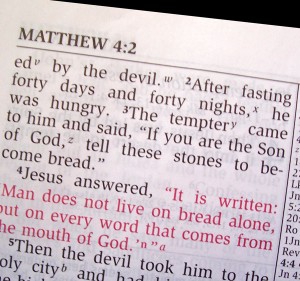I’m dismayed by the notion that the season of Lent is “unbiblical,” “pagan,” and an all-around work of the devil. Everyone is entitled to his own understanding, of course. But …
I’ve seen online rants condemning Lent as a pagan practice because the date of Easter (hence Lent, which falls on the 40 days prior to Easter) is determined by the spring solstice. Some folks condemn Lent out of hand because they (incorrectly, says this Methodist) view it as a “Catholic thing” and they are against all things Catholic. Others blame Lent for the ugly excesses of Mardi Gras, which makes as much sense to me as condemning Christian observance of Christmas because people get drunk and misbehave at Christmas parties.
A person of sincere Christian faith once informed me that Lent is unbiblical because it is not named or observed in the Bible. Yet I believe his church acknowledges the legitimacy of Christmas and Easter, which also are not named or observed in the Bible. Of course, Christ’s birth and resurrection are recorded in scripture. But the annual observances of those important events, which we call Christmas and Easter, are not. Yet who wouldn’t agree that Christmas and Easter are wonderful and spiritually uplifting occasions? Never mind whatever historical connection to paganism there might be in practices like Christmas trees and Easter eggs—the fundamental nature of the occasion is biblical and Christ-honoring.
 The same is true of the annual observance which many churches call Lent. This wonderful, spiritually uplifting season commemorates the 40-day period of fasting and prayer that Jesus Christ undertook in preparation for his journey to the cross. Like his birth and resurrection, this is an important biblical event, recorded in Matthew 4:1–11. Like Christmas and Easter, Lent should not be discredited as unbiblical because the annual commemoration began after the Bible was written, nor should it be attacked because some of the practices associated with it had pagan origins or are sometimes conducted in ways that do not honor the Lord God.
The same is true of the annual observance which many churches call Lent. This wonderful, spiritually uplifting season commemorates the 40-day period of fasting and prayer that Jesus Christ undertook in preparation for his journey to the cross. Like his birth and resurrection, this is an important biblical event, recorded in Matthew 4:1–11. Like Christmas and Easter, Lent should not be discredited as unbiblical because the annual commemoration began after the Bible was written, nor should it be attacked because some of the practices associated with it had pagan origins or are sometimes conducted in ways that do not honor the Lord God.
Honoring the Lord God, in my opinion, is what truly counts here. I urge Christians of all denominations and traditions to simply take time during the coming weeks to prayerfully prepare for the journey to the cross. Reflect upon the sacrifice the Lord Jesus Christ made there for the glory of God and your salvation. In response, consider what sacrifice you might make to bring glory to God the Father and do good for your neighbor.
To help you do that, I hope you’ll read Giving It Up for Lent, no matter what your faith tradition. If you want to explore the concept of Lenten sacrifice for the first time, check it out. If you’ve already been observing Lent and you want to breathe new life into stale or shallow Lenten practices, check it out. It includes lots of Bible references for the tradition of worshipful sacrifice. You can find information on my book page.
You can receive a free PDF copy of Giving It Up for Lent (or one of my other books if you prefer) just for the asking from now until Monday, February 9, 2015. I made that offer to the folks who are reading Dr. Terry Dorsett’s interview of yours truly, on Next Generation Evangelistic Network’s blog. Hop on over there to read the interview and hop back here to request your free book.
For another explanation of Lent, see BibleGateway’s blog post. BibleGateway.com is a wonderful resource for scripture study.
As always, I invite you to post comments and questions below.
—Linda
